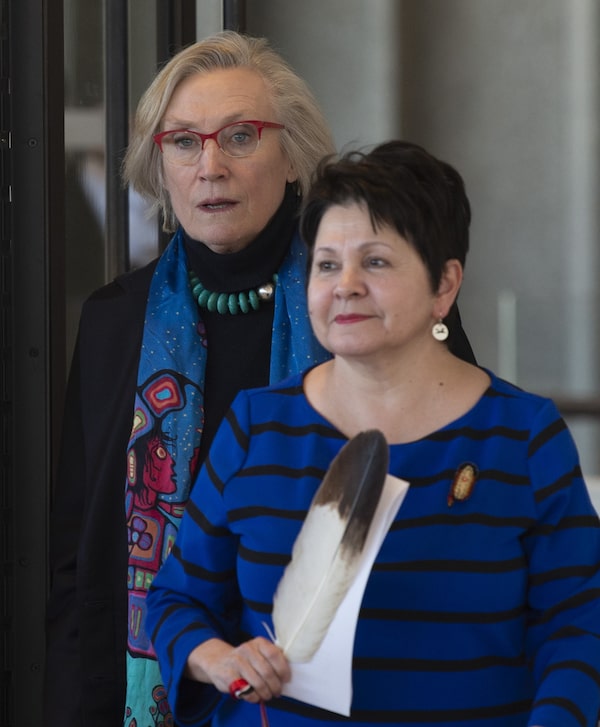
Crown-Indigenous Relations Minister Carolyn Bennett, seen here at left on March 12, 2019 next to Claudette Commanda, said that survivors being able to apply for compensation marks an 'important step towards healing and justice for day school survivors and their families.'Adrian Wyld/The Canadian Press
The federal government says thousands of Indigenous people who suffered harm at Indian day schools can apply for compensation, now that a settlement has taken effect.
The government says the settlement is based on the premise that those who were sent to the federally run schools were harmed and that all eligible class members will receive a minimum of $10,000 in individual compensation.
Additional compensation is available for those who experienced more extreme cases of abuse, the government said Monday, adding amounts that range from $50,000 to $200,000 depending on severity.
Beginning in the 1920s, Ottawa says nearly 200,000 Indigenous children attended the Indian day schools across Canada. Many students who attended the schools experienced trauma including, in some cases, physical and sexual abuse by those entrusted to care for them.
In a statement on Monday, Crown-Indigenous Relations Minister Carolyn Bennett said that survivors being able to apply for compensation marks an “important step towards healing and justice for day school survivors and their families.”
She also highlighted the legacy of Garry McLean and the work he did with other “courageous survivors to right historical wrongs."
In 2009, Mr. McLean began a legal action over the forced attendance of Indigenous students at Indian day schools across Canada that sought compensation for damages and abuses suffered. He died of cancer last year.
Last March, plaintiffs in the McLean case announced the settlement of a class-action lawsuit against Canada, which includes all survivors who attended the schools.
Class members will have 2½ years to submit their claims for compensation and the last day to submit a claim will be July 13, 2022.
The settlement also includes $200-million for projects designed to support commemoration, health and wellness programs, and the preservation of Indigenous languages and culture.
The funding is to be administered through an independent, not-for-profit corporation known as the McLean Day School Settlement Corp.
The Crown-Indigenous Relations Department says that grants will be made available to organizations to carry out the projects within communities and the corporation is developing guidelines for organizations to follow when they are applying for grants.
Roger Augustine, a representative plaintiff in the class who attended a school near Miramichi, N.B., said in a statement Monday it is now time to focus on healing and to "look forward to the health and wellness and language and culture initiatives that will ensure what we and our families endured will never be forgotten.”
Mr. Augustine, a regional chief for the Assembly of First Nations representing New Brunswick and Prince Edward Island, has spoken publicly about his ongoing concerns about young Indigenous men and boys who may internalize the effects of abuse suffered at the schools.
Claudette Commanda, another representative plaintiff, said compensation is an important next step in the process of healing and “revitalizing our languages, cultures and traditions.”
 Kristy Kirkup
Kristy Kirkup